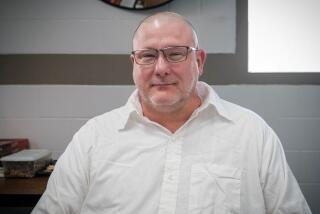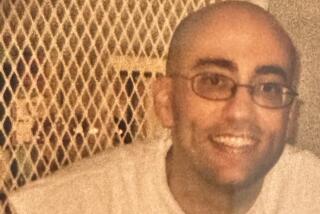Condemned Man Awaits Fate in Dozing Lawyer Case
- Share via
NEW ORLEANS — Texas should be permitted to execute a man convicted of a 1983 murder, despite the fact that his defense lawyer slept through significant portions of the trial, an attorney for the state told federal appellate judges here Monday.
The case of Calvin J. Burdine and his sleeping attorney is one of several drawing attention to Texas and its death penalty procedures, which George W. Bush, the state’s governor and the presumptive Republican candidate for president, has repeatedly defended. Bush has presided over 131 executions, more than any other governor in U.S. history, and insists that his state’s procedures are adequate to ensure that no one is put to death improperly.
Separately, the U.S. Supreme Court on Monday set aside another Texas death sentence after state prosecutors conceded that it was flawed. An expert witness for the state had improperly told jurors the defendant was likely to be dangerous because he is Latino. Eight other death row cases may be affected, state officials said.
In the case of Burdine, attorneys for the Texas attorney general’s office concede that his lawyer, Joe Frank Cannon, repeatedly slept through parts of his trial. But, they say, the conviction should stand anyway because a lawyer’s work should be considered adequate unless it can be proved that a defendant was specifically harmed by his lawyer’s failure to stay awake.
Julie C. Parsley, Texas’ deputy solicitor general, urged three judges of the U.S. 5th Circuit Court of Appeals at a hearing Monday to reverse a decision issued last September by a federal district court judge in Houston overturning Burdine’s conviction and death sentence. In that decision, Judge David Hittner ruled that it is clearly prejudicial if an attorney is sleeping through substantial portions of a trial.
“The record and evidence is clear: Cannon was actually unconscious,” Hittner wrote, citing the testimony of three jurors and the court clerk. “A sleeping counsel is equivalent to no counsel at all.”
On Monday, Parsley contended that because Cannon periodically asked questions and made arguments during the trial, his work, although shoddy, passed constitutional muster.
“He must show harm,” said Parsley. “Burdine has not done that.”
Burdine’s appellate lawyer, Robert L. McGlasson, sharply disagreed Monday. “There is indeed something terribly, fundamentally wrong with a capital defendant facing a trial for his life with an attorney who sleeps repeatedly and for prolonged periods,” McGlasson said. “Justice asleep is justice denied.”
From the outset, the 5th Circuit panel--Rhesa H. Barksdale, Edith H. Jones and Fortunato P. Benavides--peppered both sides with questions and concerns.
At first, Parsley used the word “dozing” and Barksdale quickly made it clear that he saw no difference between “dozing” and “sleeping.”
Parsley later said that from a legal point of view, there was no difference between what Cannon did and a lawyer being drunk or having a “psychotic episode” during a trial. Benavides replied that it was not easy to assess how drunk someone was, but “when you’re sleeping, you’re sleeping.”
Later, Benavides said he was concerned that if the judges agreed with Texas, they would in essence be saying that “we can put people to death in Texas” despite the fact that the state has acknowledged that the defense lawyer slept for 10 or 20 or 50 minutes at a time.
The judges also asked McGlasson some sharp questions. Barksdale, in particular, pressed McGlasson on why the issue of Cannon’s sleeping had not been raised until 10 years after his trial. McGlasson noted that Cannon, who is now dead, had represented Burdine on his first appeal and did not present the issue.
Burdine was convicted of murdering his former roommate, W.T. Wise, whose body was found in the bedroom of a trailer with two stab wounds in the back, hands tied with a cord. Burdine conceded long ago that he and a friend went to rob Wise. But Burdine denies participating in the killing. His co-defendant, Douglas McCreight, pleaded guilty to a lesser charge and was paroled after eight years, even though evidence introduced at the trial pointed to him as the principal perpetrator.
In 1994, investigators for McGlasson interviewed jurors and the court clerk while preparing to raise a constitutional challenge to the conviction and death sentence. They were told that Cannon had slept and they raised the issue in legal briefs.
In 1995, Jay Burnett, a Texas state judge, ordered a new trial for Burdine, citing Cannon’s failure to stay awake during the trial. That judge ascribed particular credibility to testimony of the court clerk who stated under oath that Cannon “fell asleep for long periods of time during the questioning of witnesses.”
The clerk, Rose Marie Berry, said that in one instance Cannon’s head was tilted downward and he was asleep “for about 10 minutes . . . at least 10 minutes” in the longest incident that she remembered. However, she said there were “lots of incidents” when Cannon dozed off for shorter periods.
Nonetheless, the Texas Court of Criminal Appeals overruled that decision, saying only that Burdine had not met the standard set in 1984 by the U.S. Supreme Court for “ineffective assistance of counsel.” That decision set a stiff standard, saying an appeals court must start with the “strong presumption” that the lawyer’s performance was reasonable and require the defendant to prove to the contrary.
Four years later, federal judge Hittner disagreed, saying another 1984 high court ruling made it clear that a sleeping lawyer was per se ineffective. That set the stage for Monday’s hearing.
Texas state prosecutor Parsley asserted that it would set a bad precedent if the appeals court ruled that a defendant is entitled to a new trial simply because his lawyer had slept for substantial portions of his initial trial. She said the defendant was obliged to demonstrate the specific harm he suffered as a result of his lawyer sleeping.
McGlasson said a transcript of the initial trial demonstrated there were lengthy periods when Cannon said nothing, including the entire prosecutor’s cross-examination of his client. “That included a question about whether Calvin preferred to be the man or the woman during a homosexual act, a question that was irrelevant, clearly prejudicial and clearly the subject of an objection,” McGlasson said.
If Judge Hittner’s decision is upheld, Burdine will be entitled to a new trial. If Hittner’s ruling is reversed, the state would be able to set a new execution date for Burdine. He already has had four stays of execution.
During a presidential debate in Los Angeles on March 2, a day after Hittner had ordered Burdine released because state lawyers missed a deadline in the case, Texas Gov. Bush was asked about Burdine’s trial. He responded that Hittner’s decision showed that “the system worked.”
Nonetheless, the state quickly appealed Hittner’s rulings and the 5th Circuit agreed that Burdine must be held on death row while his appeal proceeded.
Meanwhile in the U.S. Supreme Court Monday, a Texas killer’s death sentence was set aside after state prosecutors conceded that the penalty was based in part on the fact that he is Latino.
The Supreme Court ordered a new sentencing hearing for Victor Hugo Saldano, convicted of murdering a man for his wallet and watch in a Dallas suburb in 1996.
During the punishment phase of Saldano’s trial, psychologist Walter Quijano testified for the prosecution about Saldano’s “future dangerousness,” an aggravating factor that allows Texas courts to administer the death penalty instead of life in prison.
Quijano listed 24 factors in his assessment, including Saldano’s ethnicity. He testified that blacks and Latinos are overrepresented in prison, and that Saldano’s ethnic background “was a factor weighing in favor of future dangerousness.”
After Saldano’s lawyers appealed to the U.S. Supreme Court, Texas Atty. Gen. John Cornyn and his staff said the state “confesses error” and joined in asking for the new sentencing hearing. Saldano’s guilt was not in dispute.
Quijano gave similar testimony at the trials of eight other death row inmates, and those cases will get a closer look, said Mark Heckmann, a spokesman for the Texas attorney general’s office.
*
The Associated Press contributed to this story.
More to Read
Sign up for Essential California
The most important California stories and recommendations in your inbox every morning.
You may occasionally receive promotional content from the Los Angeles Times.











